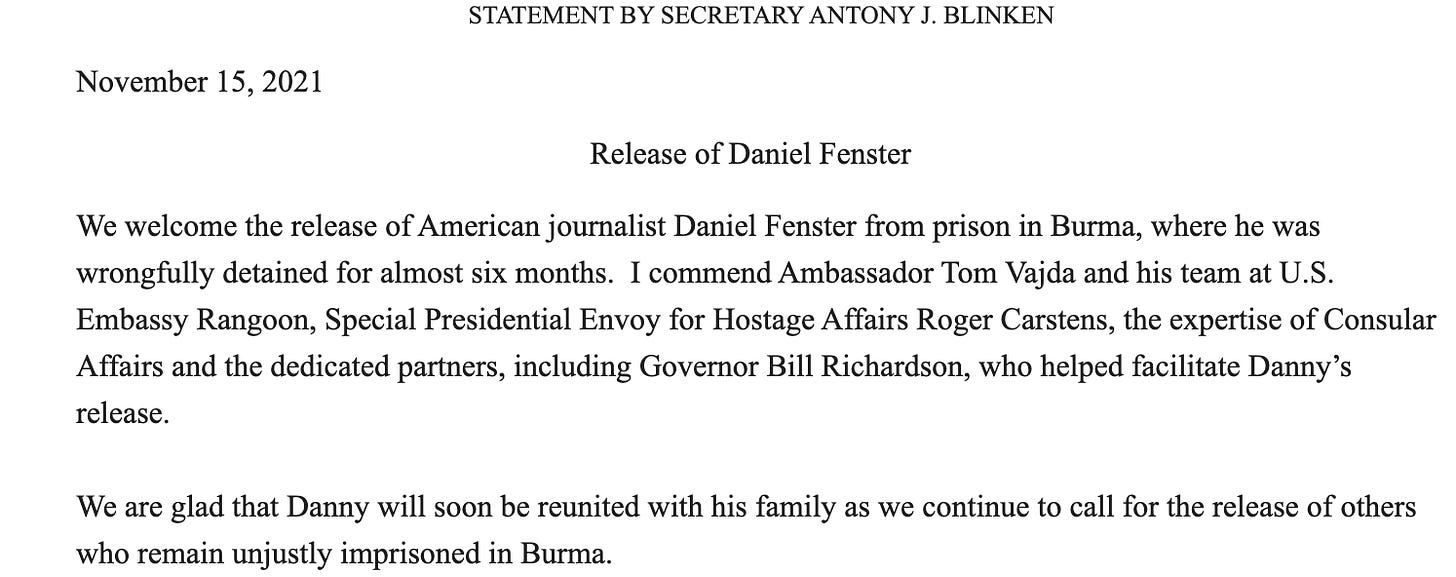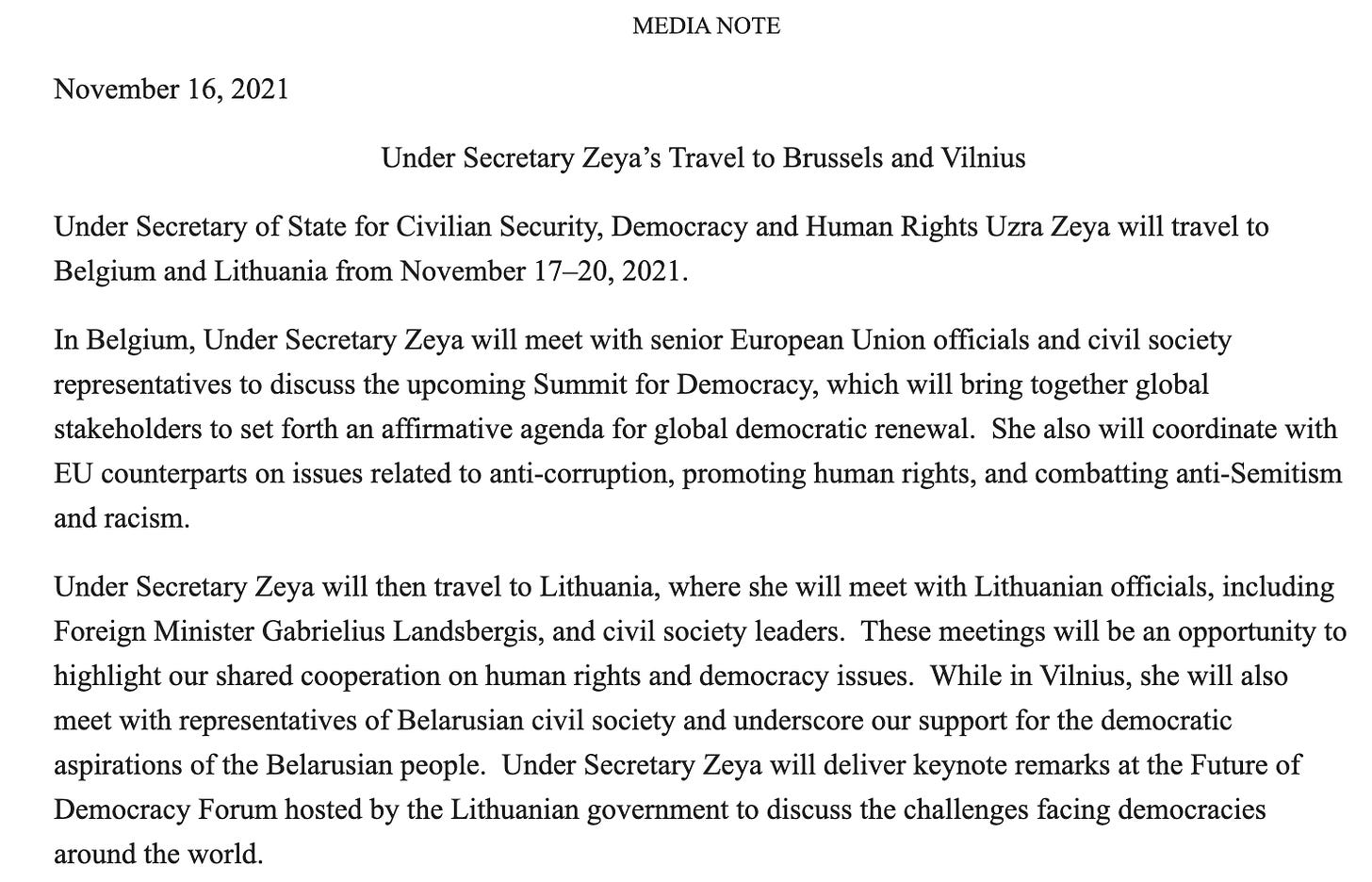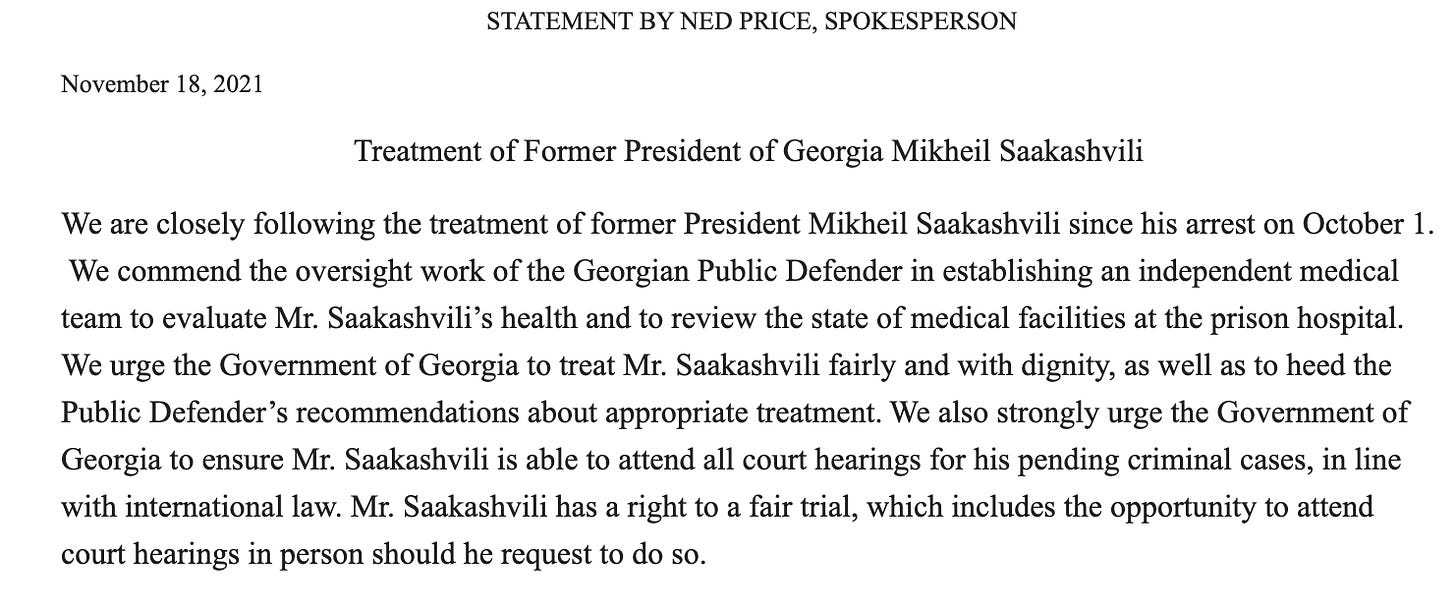Vietnamese laborers and Chinese influence in Serbia.
Hello, all! Cristina here. This week I’m speaking to Stefan Vladisavljev, an expert on Chinese influence in the Western Balkans at the Belgrade Fund for Political Excellence. We discuss the harrowing story of Vietnamese workers who were exploited and abused by a Chinese company in Serbia and what this case tells us about international labor trends and Chinese influence in the region. It’s also an intriguing story about the way Serbia’s civil society activists stood up for international workers.
But first, please send story tips or recommendations to c.maza@protonmail.com. And don't forget 👇👇
Upgrade to a premium subscription by Clicking Here.
Cristina: How did you get involved in this issue?
Stefan: For the past couple of years, I've been closely following the Chinese presence in the Western Balkans and Chinese influence through foreign direct investments like infrastructure projects and preferential loan agreements. I'm basically following all topics that are China-related in my part of the world.
I became interested in the Vietnamese workers because the company involved is the biggest foreign direct investor from China in Serbia since the beginning of the contemporary relationship [between Serbia and China] in 2009.
It is estimated to have invested around 900 million euros since 2018.
China had large investments before that in Serbia. But those were mostly the purchase of already existing assets, like old industrial socialist factories. This one started from scratch.
It’s interesting to follow because there was never this much foreign direct investment coming from China in this part of the world before this.
Cristina: What can you tell me about Zrenjanin, the Serbian city where Vietnamese workers are building a factory?
Stefan: It’s in the northern part of Serbia, called Vojvodina. It’s an autonomous province in Serbia.
Vojvodina itself is separated into three different regions, and Zrenjanin is the biggest city in the Banat region in Vojvodina. It is the regional center. It has a population of around 80,100 people, approximately, since we haven’t had a census since 2011. But it is an old industrial regional center that dates to the communist period.
It is recognized as one of the most vivid industrial centers in Vojvodina still today. It has significant companies from different countries, not solely Chinese investment. There are big companies and factories from Germany. There are also big domestic companies there.
Cristina: How did these Vietnamese workers become a national story in Serbia?
Stefan: The workers came to the attention of some local NGOs who realized they were being abused. They’re being kept in deplorable living conditions and experiencing terrible working conditions.
Ling Long is the name of the Chinese company that we’re discussing. It is constructing a tire factory. When the factory is finalized, they will produce car tires for export.
The factory is still under construction now. But because Ling Long is not a construction company, they must hire subcontractors for the construction. That subcontractor hired Vietnamese workers.
This is one of the concerns with Chinese companies in Serbia. They often bring subcontractors and workers from abroad. Usually, those workers are from China. But in this case, they brought workers from Vietnam.
A few days ago, one of the major television stations in Serbia produced a report about the dire living conditions of these Vietnamese subcontractors. They are living without electricity. They only have access to one liter of water a day per person. Ten people are sleeping in the same room, often without mattresses. They don’t have appropriate winter clothes. Right now, at night in Serbia, the temperature is around 0 degrees Celsius.
They also said the company took documents from the Vietnamese workers. Some weren’t paid regularly. They aren’t getting enough food.
Following these initial reports, civil society organizations began saying that we are dealing with a case of human trafficking.
I think that’s probably an overstatement. The workers said they signed contracts with an employment agency. They knew they were going to Serbia. But the conditions in their contracts have not been met.
Civil society organizations went to the factory to check on the situation on the ground, and they confirmed the media reports.
Then the organizations sent an official request to the relevant government institutions about the need to inspect the situation and find out why basic living standards and the labor rights of those workers are not in line with Serbia’s national laws.
Cristina: What was the company’s response to these complaints?
Stefan: The Ling Long company hired private security guards. That gained a lot of attention because there were confrontations between the security guards and activists. There was no physical confrontation. It was mostly verbal.
The whistleblower, a Vietnamese worker who spoke to the organizations and the media, got fired. So, the activists tried to get him out of the factory compound, but the private security guards wouldn’t allow them to take him.
But then some of the workers made a human shield between the whistleblower and the private security, and they managed to get the whistleblower out to the civil society activists.
After that, the company closed all the access points to the media. But some journalists had the phone numbers of the Vietnamese activists, so they are still getting some information out.
Cristina: What has the Serbian government’s response been?
The first response was quite broad. They said that there are regular inspections, and they did see any misconduct.
Later, they said that they had reported the bad conditions and some steps would be taken.
The Minister of Construction stated that the living conditions are poor, but the Vietnamese workers are getting paid $900 a month, so they could afford to find better accommodation if they wanted to do so.
After that, the Prime Minister [Ana Brnabic] said the workers would be moved from the compound to a better location. But she pointed fingers at the civil society organizations and political opposition and said they wanted to criticize all Chinese investment in Serbia.
Now the workers have been moved from the compound, and there is barbed wire around the compound. That would never have happened without civil society and the local activists.
But still, this is a trend. This isn’t the first time there have been reports about the abuse of foreign workers hired by Chinese companies in Serbia.
Cristina: Was it confirmed that the Vietnamese workers earned $900 a month? Did any whistleblowers confirm that?
Stefan: No. That was what the Minister of Construction said. The original reports claimed they were earning between 300 and 400 euros a month but weren’t always being paid regularly.
Cristina: What do we know about how these workers were hired and how they arrived in Serbia?
Stefan: My understanding is that an employment agency has hired them. You can reach out to employment agencies if you're investing in Serbia, and they will make all the arrangements for the workers coming here.
There is also a company in Serbia doing this, and they have connections with Vietnam. There are also Vietnamese workers in other locations in Serbia. Some reports say the workers had to pay around $2,000 to get a job in Serbia. That amount would presumably cover transportation costs to Serbia.
Cristina: What is the legal status of these workers in Serbia?
Stefan: That is a tricky question. When our government signs contracts with the Chinese government, either for infrastructure projects or foreign direct investment, some clauses in the contract exclude workers from Serbian laws.
So basically, while they are working on constructing a Chinese factory, they are excluded from the implementation of Serbia’s regulatory framework based on bilateral agreements that Serbia signed with China.
It is not a usual practice, but it’s an exception that Serbia is making for Chinese companies. The workers are not subjected to our laws because they are working for the Chinese.
Cristina: What do you think this case says about Chinese influence in Serbia?
Stefan: Well, I would put the ball in the Serbian court. No investment is harmful or corrosive on its own. It’s about how you treat investments and what benefits you give to investors.
In the case of China, we have not set any kind of standards, and we have not set any conditions that China must respect.
In the past decade, China has really become an essential economic partner in Serbia, especially in infrastructural development. China is the leading provider of loans for much-needed infrastructure projects. Serbia relies on Chinese foreign direct investment. We have had around 2 billion euros in investment.
Whatever Chinese companies are doing here is because Serbia allows them to do it.
What I'm writing:
• I spoke at length with Congresswoman Marcy Kaptur about her three decades in Congress, and her work on Russia, Ukraine, Belarus, Poland, and other foreign policy issues related to Central and Eastern Europe.
• My colleague Brian Dabbs and I wrote an article about the future of sanctions against the Nord Stream 2 pipeline. A bipartisan House bill would require the Biden administration to sanction Nord Stream 2. Senate Republicans introduced an identical amendment to the National Defense Authorization Act. Now it's up to Senate Democrats to decide where they stand.
• I spoke with Afghan Special Immigrant Visa recipients who – despite being issued visas – have faced administrative hurdles in Pakistan while trying to collect their visa foils. Now they are running out of money and time on their Pakistani visas. All of them have small children with them and put themselves at tremendous risk to travel to Pakistan.
What I'm reading:
• The European Parliament's committee on civil liberties, justice, and home affairs released a report following its recent trip to Slovenia. It says there is an “urgent need for legislative reforms, proper implementation, and more transparency in many areas.”
• Lawmakers in Austria voted to strip former Chancellor Sebastian Kurz of immunity, meaning that he can now be prosecuted for corruption allegations, Politico Europe reports.
• Estonia announced snap military exercises that will include installing razor wire along its border with Russia, Reuters reports. Ukraine's Interior Minister also floated the idea of building a wall on the borders with Belarus and Russia.
• China's Foreign Ministry spokesman said Lithuania will "pay" for allowing Taiwan to open a de fact embassy in the country, Reuters reports.
• Polish border guards used teargas and water cannons against migrants trying to cross the border, while Warsaw continues to ignore EU requests for Frontex and NGOs to obtain access to the border, Reuters reports.
• The European Court of Justice ruled that a Hungarian law that criminalizes helping asylum seekers violates EU law, Politico Europe reports.
• The same court determined that Polish rules allowing the country's Justice Minister to assign and remove judges from higher criminal courts violate EU law. Read their press release here.
• Armenia and Azerbaijan accused each other of opening fire near Nagorno-Karabakh, Agence France-Presse reports.
• A number of Armenian troops were killed during a clash between Armenian and Azerbaijani forces at the border, the BBC reports.
• Ukraine imposed sanctions on 28 employees of Russia’s special services, Reuters reports.
• Ukraine’s Foreign Minister Dmytro Kuleba accused Russia of failing to engage in four-way peace talks on the war in eastern Ukraine, and trying to undermine the peace process by publishing confidential diplomatic correspondence, Reuters reports.
• Greece is putting two dozen aid workers on trial for espionage due to their role in assisting migrants who arrived in Greece between 2016 and 2018, the New York Times reports.
• The foreign ministers of EU member states agreed to impose sanctions on the Russian mercenary company Wagner Group, the Wall Street Journal reports.
• The EU agreed to impose new sanctions against the authoritarian government in Belarus in response to the border crisis on the EU border, the Washington Post reports. New sanctions were issued specifically against “individuals and entities organizing or contributing to activities by the Lukashenko regime that facilitate illegal crossing of the E.U.’s external borders.”
• Hackers thought to be behind attacks on governmental agencies have been linked to the Belarusian government, according to a new report by the cybersecurity company Mandiant.
• The EU is considering creating a joint military force of up to 5,000 troops by 2025, Reuters reports. It would be able to intervene in a range of crises without relying on the U.S.
• The Biden administration is considering sending some of the Afghan evacuees at a U.S. military base in Kosovo back to Afghanistan if they cannot clear the vetting process to go to the U.S., CNN reports.
•Hindu extremists in India attacked the home of a Muslim former Foreign Minister who recently published a book in which he compared Hindu nationalists under Prime Minister Narendra Modi to terrorist groups such as the Islamic State. Al Jazeera has the report.
• Police in India’s Maharashtra state killed at least 26 Maoist militants in an ambush, Reuters reports.
• Russia started to deliver the first S-400 missile defense system to India, Al Jazeera reports.
• Turkish authorities arrested a man considered a suspect in the July assassination of Haitian President Jovenel Moïse, the Associated Press reports.
• The Vice Foreign Ministers of Japan and South Korea pulled out of a joint press conference with U.S. Deputy Secretary of State Wendy Sherman following a disagreement over the Takeshima/Dokdo islands, the Guardian reports. The islands are administered by South Korea but claimed by Japan.
• The chair of the Commanders of Israel's Security – a group of more than 300 former generals and top security officials in Israel – released a letter expressing support for the U.S. reopening a consulate for Palestinians in Jerusalem, arguing that it is in Israel's national security interest.
• Sudanese security forces killed at least fifteen protestors and wounded many others after firing into crowds demonstrating against the October military coup, the New York Times reports.
• Late Libyan dictator Colonel Muammar el-Qaddafi's son announced that he will run for president in Libya’s upcoming election, the New York Times reports. Libyan military commander Khalifa Hifter also filed as a candidate, the Associated Press reports.
What the State Department says:
Upgrade to a premium subscription by Clicking Here.
You can also contact me for any reason by writing to c.maza@protonmail.com.









